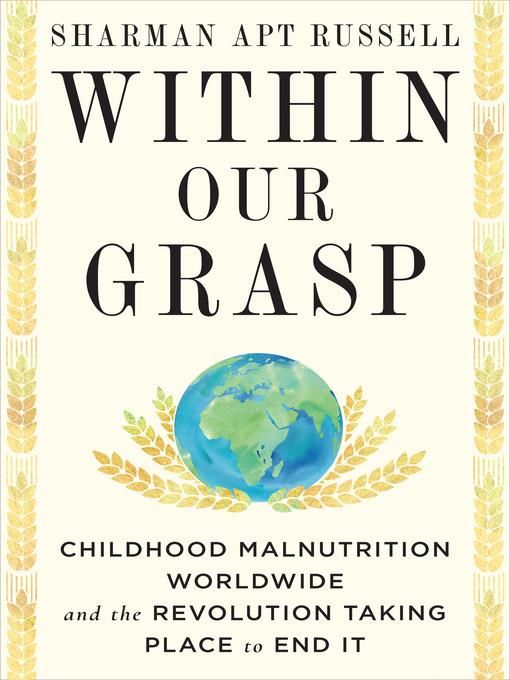
Within Our Grasp
Childhood Malnutrition Worldwide and the Revolution Taking Place to End It
- اطلاعات
- نقد و بررسی
- دیدگاه کاربران
نقد و بررسی

January 18, 2021
Nature writer Russell (Diary of a Citizen Scientist) presents a comprehensive survey of recent trends in the fight to end childhood hunger and malnourishment. In Malawi, where global warming has exacerbated the country’s annual “hunger season” and 37% of children are stunted by malnutrition, she visits a factory that makes ready-to-use therapeutic foods, which don’t require cooking, refrigeration, or mixing with potentially contaminated water. Russell provides a brief and informative history of these foods, which have a peanut butter base for protein and are specifically designed to rehabilitate those severely malnourished, and also details how international aid organizations are working closely with communities in Malawi and other countries to develop educational and subsistence farming programs. According to the scientists and aid workers Russell profiles, childhood malnutrition is a complex problem that demands a multipronged approach, including improved farming methods, greater access to medical care, and empowering and educating impoverished women. Russell also details efforts to get multinational corporations such as Pepsi and Coca Cola to provide fortified, nutritious foods to communities that need them. Expansively reported and gracefully written, this cautiously optimistic account brings an important yet underreported issue to the fore.

February 15, 2021
A heartening survey of what good people are doing to help end childhood hunger. Russell writes that nearly 1 in 4 children under the age of 5 are malnourished, or "stunted." If this persists, they grow into stunted adults. Mixing history, nutrition science, interviews with experts, and accounts of her visits to aid organizations and projects (with a focus on Malawi), the author delivers an engrossing, modestly optimistic narrative about a sadly evergreen issue. Although most victims of malnourishment grow up in poverty, notes the author, adequate food is often available for adults. In many cases, external circumstances condemn their children. With no time to breastfeed for the first six months, overworked mothers introduce solid food too early, usually non-nutritious gruel containing local water and local germs. In Africa, diarrhea causes the most deaths among poor children. Another unnerving fact is how badly humanitarians performed for decades after World War II. The accepted aid method was to ship food to needy nations and set up feeding stations. However, many couldn't reach the stations, and severely malnourished children received dense, calorie-rich food that did more harm than good. By the 1990s, organizations learned to use what was working based on scientific research and help as many people as possible. In Malawi, one of the world's poorest countries, Russell introduces us to a legion of international humanitarian groups striving to feed children, educate and empower mothers, and teach hardscrabble farmers to grow more nutritious crops more efficiently. The author devotes much attention to entrepreneurs working to produce tasty, highly nutritious snacks that appeal to children at a low but profitable cost. Readers may have mixed feelings over the emphasis on private enterprise, but with humanitarian groups overstretched and leaders in many developing nations largely indifferent, there are few alternatives. As the author notes, "there is no standardized approach to any problem." A sensible, encouraging account of progress (if not a "revolution") in feeding hungry children.
COPYRIGHT(2021) Kirkus Reviews, ALL RIGHTS RESERVED.

March 12, 2021
Self-proclaimed "citizen scientist" Russell lives up to that title in her follow-up to Hunger: An Unnatural History. This latest work is an exploration of the history of relief work to eradicate childhood malnutrition and the science behind the tireless efforts of those involved. The narrative of her travels to places throughout the world brings readers a view into the lives and experiences of people affected by famine, drought, and poverty. Russell highlights topics such as agroecology, participatory research, and how creating jobs and implementing universal health care and equality in education can reduce and possibly eliminate the effects of poor childhood nutrition. She also writes that coordinating efforts with women living in rural communities can empower them and thus improve the lives of their children. This is an ideal update to previous works on the topic, including Seed Sovereignty, Food Security, by Vandana Shiva. Pictures and maps throughout add context. VERDICT Russell's passion for citizen science, the important subject she explores, and her jargon-free presentation of information relating to malnutrition will open worlds for most readers, from high school students to sociologists.--Laura Lipke, A.T. Still Univ., MO
Copyright 2021 Library Journal, LLC Used with permission.




دیدگاه کاربران